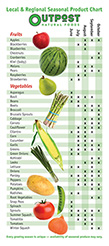Call To Action

Posted January 2026
Support Organic Farmers & Healthier Food Systems - BIPARTISAN
Outpost believes organic food is essential to healthy people, farms, and the environment. Organic farming reduces reliance on synthetic fertilizers and pesticides, helping protect soil, water, and human health — but many organic farmers face challenges getting their products from farms to store shelves.
The Domestic Organic Investment Act is a bipartisan bill that would strengthen U.S. organic agriculture by investing in processing, storage, and distribution infrastructure. These investments support small farms and co-ops, grow domestic organic supply, and reduce reliance on imported organic products.
The bill has been introduced in Congress and is currently under review by Agriculture Committees. This is an important time to let elected officials know that organic food, small farms, and resilient food systems matter.
Background Info from the Organic Trade Association
See below for further resources on how to contact your representatives, and a brief script you can use to call.
Make your voice heard!
Elected officials receive shockingly little feedback from their constituents, so a small group of citizens actually DO have the ability to create change! With nearly 23,000 owners, we want you to get comfortable with contacting your elected officials and make your voice heard about issues important to sustainable agriculture and food systems.
Here’s the goods
We give you the info and the ask, you give just 1 minute of your time to hop on the horn and take an active role in our democracy. Pretty sweet deal, eh?
Step 1: Call the Congressional switchboard at (202) 224-3121 to be connected automatically or visit Congress.gov to find your representatives
Step 2: Contact their office and let them know this issue is important to you.
Strategy
The most effective strategy is phone calling. If you can't call on the phone, email is the next best bet followed by a letter and lastly social media.
- Be respectful! A thoughtful and polite statement delivered calmly is best received.
- Be brief. Keep it short and to the point.
- Give them your address: Comments coming from their constituents as opposed to those outside their district get much higher priority.
Call Script
No need to think on your feet, just call and read this script and your feedback will be recorded with their staffer!
Hello, my name is [Name], and I’m a constituent from [City, State / ZIP].
I’m calling to ask [Senator/Representative Name] to support the bipartisan Domestic Organic Investment Act.
This bill supports small farms and co-ops by investing in organic processing and distribution infrastructure, helping expand U.S.-grown organic food produced without synthetic fertilizers and pesticides.
Thank you for your time.








